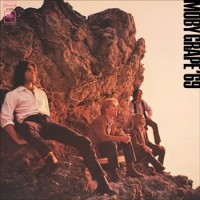
“We have promised each other no more gimmicks, no more hypes, no egos, nothing ever again but the music…” So read the sleeve notes of Moby Grape’s third studio album (or fourth, if you count the listless, blues-noodling Wow leftovers of Grape Jam). Talk about a band with self-esteem issues!
Certainly, by the end of the ’60s the Grape did have a lot to be sorry for, and their bad luck of biblical proportions is now the stuff of legend. Their 1967 debut album, one of the best of the decade–or perhaps ever–was buried under an avalanche of one of the most idiotic major label marketing campaigns in the history of the recording industry. Its follow-up, Wow, eschewed their trademark punchy and concise triple guitar attack in favor of studio gimmickry and various period excesses (although it is still worth a listen). Along the way, they lost their driving creative force, Skip Spence, when, during one of Wow’s recording sessions, the increasingly drug-addled and unstable guitarist tried to kill drummer Don Stevenson with an axe. (Thankfully, he failed). It’s a wonder that Moby Grape was able to continue on at all, but in 1969 they returned to the studio, sans Spence, in an attempt to redeem themselves. Surprisingly, this last ditch effort birthed a minor masterpiece.
’69 has no business being as good as it is, but against all odds it’s a triumph, a record that reminds us of what made Moby Grape so great in the first place. “Ooh Mama Ooh”, showcases the band’s playful side and inimitable harmonies, with a surprising twist: Its doo-wop choruses reflect the 50s nostalgia beginning to permeate the pop-culture subconscious at the time. “Trucking Man” rocks equally as hard as “Omaha” or any of the other uptempo tracks on their debut. But perhaps ’69’s greatest strength is its ballads. “Ain’t that a Shame” and “I’m Not Willing” prove Moby Grape to be masterful early adopters of country rock, these songs’ very presence alone placing ’69 in the canon alongside Sweetheart of the Rodeo and The Gilded Palace of Sin. Conspicuous in his absence throughout most of this is Spence, but the album’s final track,”Seeing”, gives him the last word. With parts of the track recorded shortly before his admittance to a mental hospital, his fragile and damaged vocals, coupled with roaring guitars, comprise one of the era’s most darkly psychedelic epics.
One would think that after this return to form that great things lay ahead, but for Moby Grape, twas ever thus. Bassist Bob Mosely was the next to lose his mind, shocking his bandmates by cutting his hair and joining the Marines. Now down to a trio, Moby Grape returned to the studio in 1970 to record Truly Fine Citizen, another album that should have been a lot worse than it was considering the circumstances. But despite some inspired moments, as a whole it showed the mojo beginning to fade. It lacked the shine and fleeting optimism of what came before, thus cementing ‘69’s place in history as the last moment of true genius for a band who should have had many more. —Richard P


